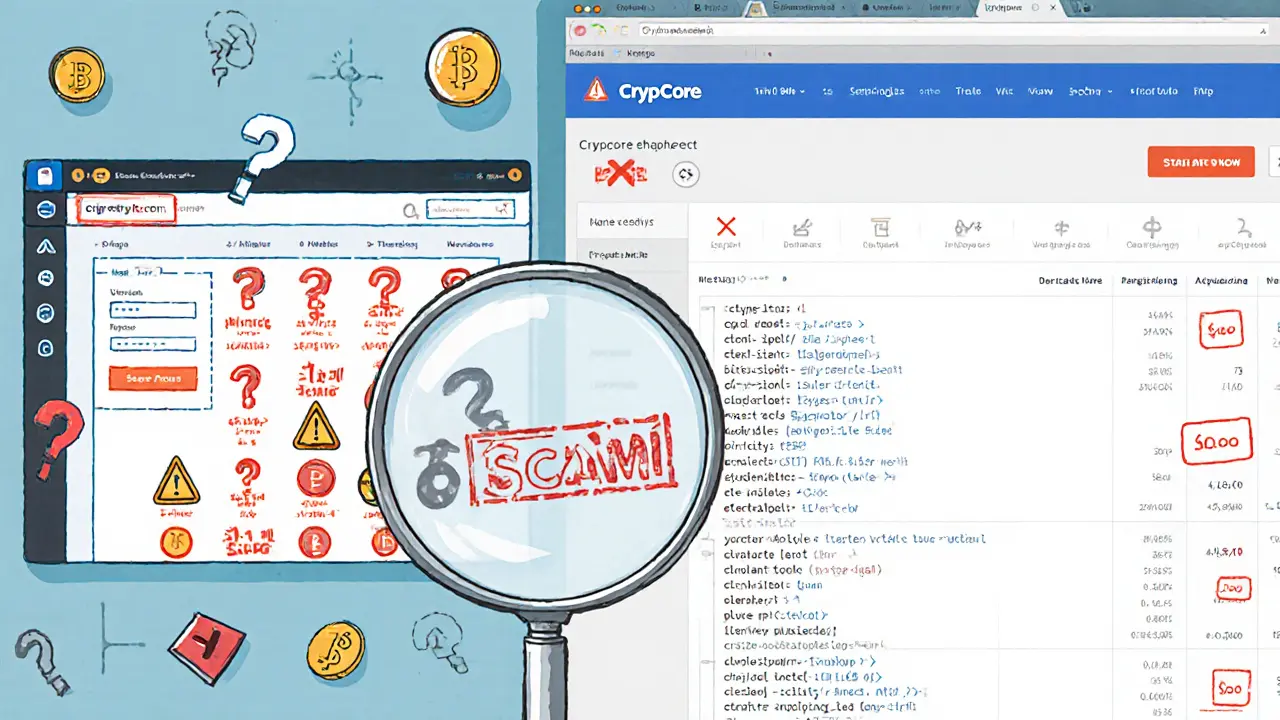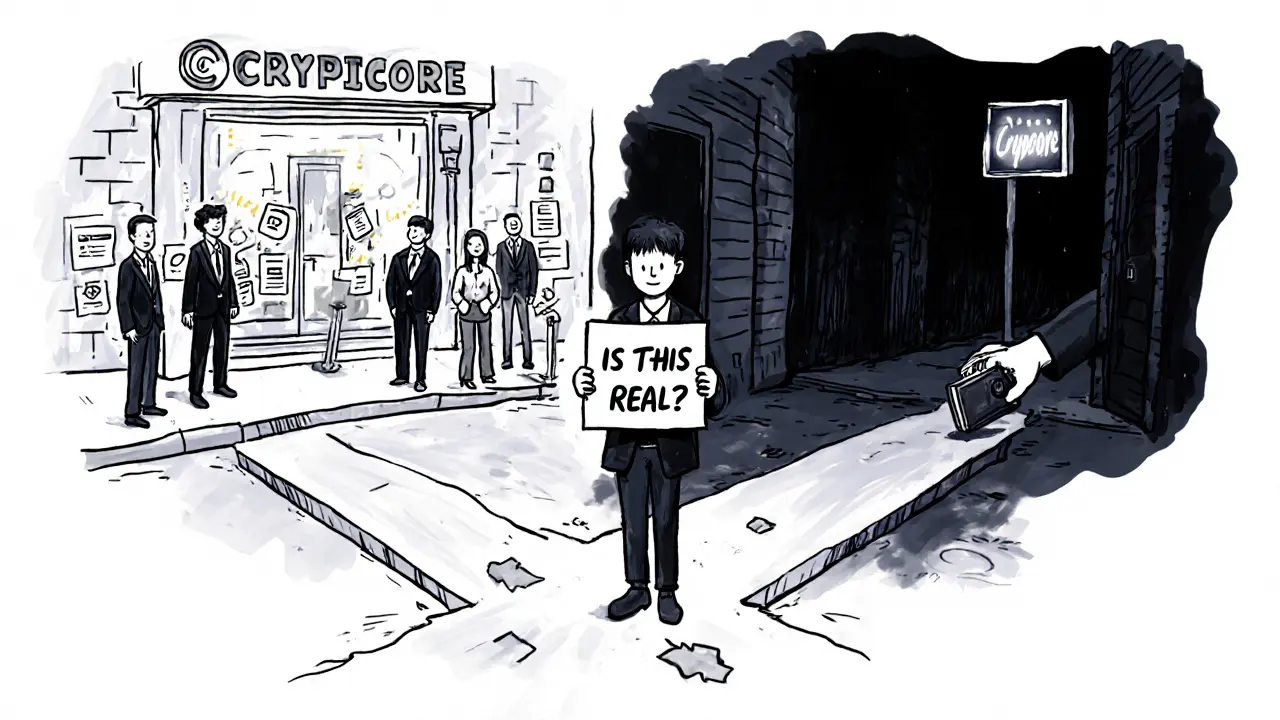Crypto Exchange Verification Tool
Verify Your Exchange
Check if a cryptocurrency exchange is legitimate using the same verification criteria used by industry experts.
Verification criteria:
Key Verification Criteria
1. Listed on CoinGecko/CoinMarketCap
Legitimate exchanges appear on major crypto data platforms with verified trading volume and metrics.
2. Security Measures
Real exchanges implement cold storage, 2FA, withdrawal whitelisting, and regular audits.
3. Regulatory Compliance
Valid licenses from financial authorities and documented KYC/AML procedures.
4. Transparent Team
Public team members with verifiable LinkedIn profiles and company registration.
5. Active Community
Real discussions on Reddit, Trustpilot reviews, and social media engagement.
Red Flag Checklist
Missing any of these indicates potential scam.
There’s no such thing as a verified Crypcore crypto exchange. If you’ve seen ads, forum posts, or YouTube videos pushing it as a trading platform, you’re being misled. What’s being sold as an exchange is either a scam, a confused reference to a token project, or a ghost platform with zero real infrastructure.
Let’s cut through the noise. A real cryptocurrency exchange doesn’t vanish from public records. It doesn’t hide its team, its security, or its trading volume. It doesn’t appear only on obscure review sites with no user comments. And it definitely doesn’t confuse users by borrowing the name of a completely different project.
Search results for "Crypcore" pull up two entirely different things: one is a token called CrypCore (CRYP), and the other is a vague, unverified mention of an exchange that doesn’t appear on any major crypto data platform. These are not the same thing. Mixing them up is dangerous.
What Is CrypCore (CRYP) Actually?
CrypCore (CRYP) is an ICO project, not an exchange. According to CoinCodex and other token trackers, its goal is to create a cryptocurrency with a "solvency system" meant to reduce price swings. That sounds fancy, but it’s not a trading platform. It’s a token with a whitepaper, a supply cap, and possibly a team trying to build something - but nothing that lets you buy Bitcoin, sell Ethereum, or trade altcoins.
There’s no wallet integration, no order book, no deposit or withdrawal system for CRYP that functions like an exchange. If you’re looking to trade crypto, CRYP won’t help you. It’s a speculative asset, not a tool. And even then, it’s not listed on any major exchange like Binance, Kraken, or Coinbase. You’d need to find it on a tiny, unregulated DEX - if it’s even tradable at all.
Why You Won’t Find Crypcore on CoinGecko or CoinMarketCap
Every legitimate crypto exchange shows up on CoinGecko and CoinMarketCap. These sites track trading volume, liquidity, supported coins, and user reviews. They also verify that platforms have real infrastructure - API access, cold storage, KYC procedures, and audit reports.
Search for "Crypcore" on either site. Nothing. Zero results. That’s not an oversight. That’s a red flag. Even small, niche exchanges like BitMart or KuCoin (launched in 2018) are listed because they have verifiable data. Crypcore doesn’t. Not even a trace.
Compare that to Crypto.com, which handles over $17 billion in monthly volume. Or Bitstamp, which processes $1.2 billion daily and keeps 98% of funds in cold storage with $100 million insurance. These platforms don’t hide. They publish audits, regulatory licenses, and team backgrounds. Crypcore? No website. No team page. No contact email. No social media with real engagement.
The Red Flags Are Everywhere
Here’s what a real exchange must have - and what Crypcore doesn’t:
- Trading volume: No public data. No charts. No API feeds.
- Security: No mention of cold storage, two-factor authentication, or withdrawal whitelisting.
- Regulation: No licenses. No compliance with FATF Travel Rule or MiCA. No KYC/AML process documented.
- Support: No live chat. No help center. No ticket system.
- Community: Zero Reddit threads. No Trustpilot reviews. No Twitter/X followers with real discussions.
- Coins listed: One source claims it supports "just 12 coins" - but even that list is unverified. No official trading pairs are published.
These aren’t minor omissions. They’re complete failures of transparency. Legitimate exchanges compete on trust. They publish everything. Crypcore publishes nothing.

Who’s Behind This? And Why?
There’s no registered company. No domain history. No LinkedIn profiles for founders. No press releases from 2020 or 2021 announcing its launch. No GitHub repo. No whitepaper download. Nothing.
This pattern matches known crypto scams. Fraudsters create fake exchange names that sound technical - "Crypcore," "Bitvortex," "CryptoNexus" - then run ads targeting beginners who don’t know how to check legitimacy. They promise low fees, fast withdrawals, and "exclusive coins." Then they disappear with your deposit.
Some of these platforms even clone the UI of real exchanges like Binance or KuCoin. They look real - until you try to withdraw. Then you get silence. Or a request for more "verification fees."
What Happens If You Deposit?
If you’ve already sent crypto to a site claiming to be Crypcore, stop. Do not send more. Do not reply to "support" emails. Your funds are likely gone.
Even if you haven’t deposited yet, don’t create an account. No KYC means no recourse. No license means no legal protection. If the site vanishes tomorrow - and it will - you have zero chance of getting your money back.
Real exchanges like Coinbase or Kraken are insured, regulated, and audited. They have legal teams. They have customer service. Crypcore has a website with a login button and nothing else.

What Should You Use Instead?
If you want to trade crypto safely, use platforms with a proven track record:
- Coinbase: Best for beginners. Fully regulated in the U.S. and EU.
- Kraken: Strong security, low fees, and deep liquidity.
- Binance: Highest volume, widest coin selection - but check local regulations.
- Bitstamp: One of the oldest exchanges, with strong European compliance.
All of these have public audits, real teams, and thousands of user reviews. You can verify their existence with a 5-minute Google search. Crypcore? You’d need a time machine to find proof it ever existed.
Final Verdict: Don’t Even Click
Crypcore is not a crypto exchange. It’s a phantom. A name borrowed from a token project, used to trick people into sending funds to a black hole.
There’s no legitimate review to write because there’s nothing to review. No platform. No service. No trust. No future.
If you see "Crypcore" anywhere - on a YouTube ad, a Telegram group, or a forum post - close the tab. Block the site. Report it. And tell someone else. This isn’t just a bad exchange. It’s a warning sign for the entire crypto space: if it doesn’t leave a trace, it’s not real.
Is Crypcore a real crypto exchange?
No, Crypcore is not a real crypto exchange. There is no verifiable platform under that name with trading volume, security protocols, regulatory licenses, or user reviews. References to it are either confused with the CrypCore (CRYP) token project or are part of a scam operation.
What is CrypCore (CRYP)?
CrypCore (CRYP) is a cryptocurrency token project focused on creating a stable asset using a solvency mechanism. It is not an exchange. It does not allow users to trade Bitcoin, Ethereum, or other cryptocurrencies. It’s a speculative token with no major exchange listings.
Why doesn’t Crypcore show up on CoinGecko or CoinMarketCap?
Because it doesn’t exist as a trading platform. CoinGecko and CoinMarketCap only list exchanges that have verified trading data, API access, and operational infrastructure. Crypcore has none of these. Its absence is proof it’s not a legitimate exchange.
Can I trust Crypcore if it has a website and a login page?
No. Scammers build convincing websites to trick users. A login page doesn’t mean the platform is real. Look for audits, regulatory licenses, team names, and community reviews. Crypcore has none of these. If you deposit funds, you risk losing them permanently.
What should I do if I already sent crypto to Crypcore?
Stop all communication. Do not send more funds. Unfortunately, once crypto is sent to a scam platform, recovery is nearly impossible. Report the site to your local financial authority and warn others. In the future, always verify exchanges through CoinGecko, official websites, and trusted community sources before depositing.
Are there any legitimate exchanges with similar names?
No legitimate exchange uses the name "Crypcore." However, scammers often mimic names like Crypto.com, Kraken, or Binance to confuse users. Always double-check spelling. Crypto.com is not Crypcore. Kraken is not Crypcore. Any variation is likely a scam.

i saw this crypcore thing on a youtube ad last week and almost clicked. glad i checked here first. never trust a platform that doesn't show up on coingecko. simple as that.
OH MY GOD. THIS IS THE THIRD TIME THIS MONTH I'VE SEEN THIS SCAM. CRYPCORE? MORE LIKE CRY FOR HELP BECAUSE YOUR WALLET JUST GOT EATEN BY A DIGITAL BLACK HOLE. 🚨☠️
Of course it’s a scam. The government lets these fake exchanges fly under the radar because they’re too busy protecting the big banks. They want you to use Coinbase so they can track every transaction. Crypcore might be fake-but at least it’s free from surveillance.
Thank you for this meticulously researched breakdown. It’s imperative that new entrants to crypto understand the non-negotiables: verifiable infrastructure, regulatory compliance, and public transparency. The absence of any one of these elements is a catastrophic red flag. Do not underestimate the sophistication of these phishing operations-they are engineered to exploit trust.
So Crypcore isn't real... but somehow it has 50k followers on Telegram? Funny how the most non-existent platforms always have the most 'exclusive' communities. 😏
just saw a guy on reddit trying to sell 'Crypcore coins' for 0.02 btc. dude, you're not saving money-you're just funding a ghost. walk away. seriously.
There is no legitimate exchange called Crypcore. There is no trading volume. There is no team. There is no website with verifiable domain history. There is no API. There is no KYC. There is no customer support. There is no insurance. There is no audit. There is no trace. It does not exist. Do not engage.
bro i fell for this last year 😭 sent 0.5 eth to 'Crypcore'... then the site went dark. now i just use coinbase and sleep better. 🙏
Let me be unequivocally clear: The notion that Crypcore is a legitimate exchange is not merely incorrect-it is dangerously deceptive. The absence of regulatory oversight, public audit trails, or verifiable infrastructure renders any interaction with this phantom entity an act of financial recklessness. Protect your assets. Educate others. Avoid.
Wait… so if Crypcore isn’t real… why does it have a ‘contact us’ page? And why does it say ‘24/7 support’? And why does the logo look almost like Binance’s? This is so… manipulative. I feel sick.
I’m so glad someone finally wrote this. I’ve been trying to warn my cousin for weeks-he kept saying ‘but it’s got a website!’ Like, duh, scammers use WordPress. 😑
you think this is bad wait till you see the new 'Crypcore Wallet' app that's popping up on android stores. it's literally just a phishing clone with a fake seed phrase generator. people are losing everything. i'm not even mad. i'm just disappointed in humanity
yeah yeah i get it it's a scam. i'm just here for the memes.
lol i just saw someone on twitter say 'Crypcore is the future'... bro, the future is already here and it's called Coinbase. go check your wallet.